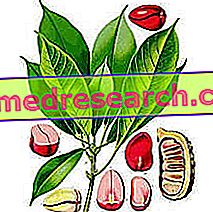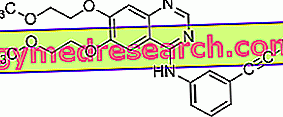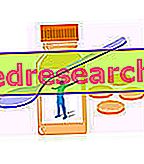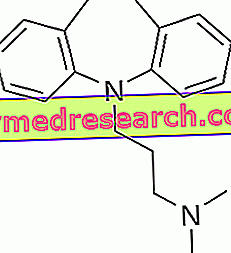
Scientific name
Cola nitida, sin. Kola acuminataFamily
SterculiaceaeOrigin
AfricaUsed Parts
The seeds of the tegument are used in the plantChemical constituents
- Flavonoids;
- Catechic tannins;
- procyanidins;
- Polyphenols;
- Methylxanthines (theobromine, theophylline and caffeine).
Cola in Herbalist: Property of the Cola
Cola is traditionally used as an anti-fatigue and diuretic remedy, but in reality it is used as a source of caffeine. It is present in numerous herbalist preparations, also together with ephedra, as a slimming and neuromuscular stimulant.
Cola is also used against depressive syndromes, in the presence of headache and during convalescence.
Biological activity
Since the cola exerts a proven stimulating effect in the central nervous system, its use has obtained official approval for the treatment of asthenia, physical mental fatigue and weakness.
The stimulating effect exercised by the plant is ascribed to the methylxanthines contained in it, especially to caffeine.
This methylxanthine stimulates the central nervous system and the heart muscle, increasing its strength of contraction (positive inotropic effect), but not only. In fact, caffeine also has a weak positive chronotropic effect, promotes lipolysis and glycolysis, has a mild diuretic action and stimulates the secretion of gastric juices.
Cola against fatigue and the symptoms associated with it
As mentioned, thanks to the stimulating action of the central nervous system and the cardiac muscle exerted by the caffeine contained within it, the use of cola has been officially approved for the treatment of asthenia and all the symptoms associated with it, such as tiredness physical and mental, weakness and difficulty concentrating.
For the treatment of these disorders, cola must be taken internally.
Generally, it is recommended to take about 1-3 grams of drug from two to three times a day.
However, for more detailed information on the use of cola in the treatment of the aforementioned disorders, see the article on "Curing with the Cola".
Cola in folk medicine and homeopathy
In folk medicine, cola seeds are chewed to prevent morning sickness and to treat headaches. The powdered seeds, on the other hand, are used as an antidiarrheal remedy.
Externally, cola is used in traditional medicine in cataplasms for the treatment of skin inflammations and wounds.
Cola is also used in homeopathic medicine, where it can be found in the form of granules, mother tinctures and oral drops. In this context, the plant is used in the event of reduced physical and mental performance, decreased alertness and depression.
The amount of homeopathic remedy to be taken can vary from one individual to another, also depending on the type of disorder that needs to be treated and depending on the type of preparation and homeopathic dilution that is intended to be used.
Side effects
If used correctly, cola should not cause undesirable effects. However, in some cases, hyperexcitability, difficulty in falling asleep, restlessness and gastric disturbances may occur.
Contraindications
The systematic and continuous use of cola is contraindicated - as are all methylxanthine drugs - in cases of ischemic heart disease, hypertension, hyperthyroidism and insomnia.
Furthermore, the use of cola and its preparations is also contraindicated in patients suffering from gastrointestinal ulcers, during pregnancy and during lactation.
Warnings
The use of products containing cola and ephedra ( Ma Huang ) for anorectic and slimming purposes is strongly discouraged; this recommendation is based on the frequent side effects at the cardiovascular level and on the numerous drug interactions.
Cola-based preparations should not be taken in the evening as they can cause insomnia.
Pharmacological Interactions
- I-MAO: hypertensive crisis;
- oral contraceptives, cimetidine, verapamil, disulfiram, fluconazole and quinolonics inhibit the metabolism of caffeine, with possible increase of its stimulating effects;
- thyroid hormones, adrenaline, ergot alkaloids, ephedra, synephrine: it enhances its effects;
- oral anticoagulants: reduces their activity;
- phenylpropanolamine: increased blood pressure;
- lithium: reduction of lithium levels in the blood;
- benzodiazepines: reduction of sedative effects;
- antiarrhythmics: increased caffeine plasma concentration;
- iron: it reduces its absorption;
- Aspirin: the caffeine contained in the cola increases its bioavailability;
- phenytoin: increases the metabolism of caffeine;
- fluoroquinolones: increase the concentration of caffeine in the blood;
- ipriflavone: possible increase in the concentration of caffeine in the blood;
- enzyme inducers: reduction of caffeine in the blood;
- macrolides: increased caffeine in the blood;
- ticlopidine: increased caffeine in the blood.



